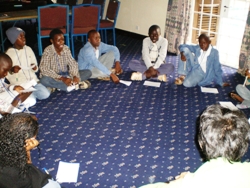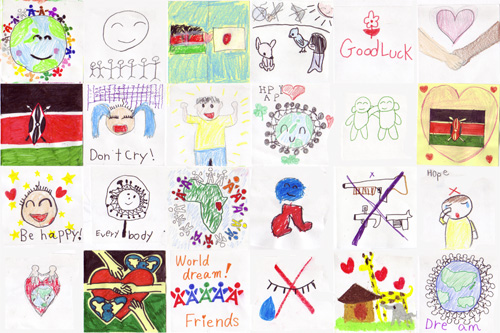Happy New Year to everyone.

I think most of us are probably peacefully watching TV shows, thinking to ourselves, "well, there goes another year."
At the end of the year in Kenya, where one of Pangaea's branches is located, a close presidential election took place. Before the election results were announced, violence broke out, and 124 died between the 27th of December and today, according to this morning's newspaper. In Kisumu, where Pangaea is attempting to start activities in February, many casualties were suffered. It seems that this happens with every election, and because of this we set back the starting date from December to February, when we hope a calmer period will begin.
Nairobi also seems to have experienced violent activities, but it seems that the areas hit worst were the slum districts' community centers, which had agreed to begin participating in activities with us. Seeing the pictures of places we have connections to made us very worried. Before starting Pangaea, I think we probably would have viewed these unfeelingly, stopping only to say, "well, I guess that's what happens after elections." But now that we know people living in such places, we feel truly worried and send lots of emails and browse the internet for more information.
The first time we went to Kenya was in 2002. Within the past 6 years, the country has seen much growth, and it seems that many things have changed. Crime in the city seems to be much the same as always, but locations outside downtown have started to see their markets well-stocked, and the passengers that used to ride sticking out of buses and cars have now begun to wear seatbelts. There have been dramatic improvements in traffic rules. And though they're busy, the Kenyans have an energy like that of the families in the good old days, working together for a better future - it's an energy that seems hard to come by even in Japan these days.
The smiles of children in every country are the same. They are smiles that make us happy.
Here's to a new year without further casualties.
 APAN 2008
APAN 2008

 Happy New Year to all!
Happy New Year to all! I'm Keiko Yamamoto, a journalist with NHK. Upon joining NHK in 1995,
I first worked for the city news department in Tokyo, where I was in
charge of reporting on MEXT and so on, then transferred to Nagoya in
August, last year. I have been on maternity leave since last December
(The baby is due on January 28th!)
I'm Keiko Yamamoto, a journalist with NHK. Upon joining NHK in 1995,
I first worked for the city news department in Tokyo, where I was in
charge of reporting on MEXT and so on, then transferred to Nagoya in
August, last year. I have been on maternity leave since last December
(The baby is due on January 28th!)  Whether or not activities in Kenya will recommence still remains undecided at this time. Last weekend at Pangaea activity in Kyoto and Mie, we spoke to the children about the tragic events occurring in Kenya. Even if we do send them messages, we can't be sure of when we will next receive responses. In any case, though, we pray for their safety.
Whether or not activities in Kenya will recommence still remains undecided at this time. Last weekend at Pangaea activity in Kyoto and Mie, we spoke to the children about the tragic events occurring in Kenya. Even if we do send them messages, we can't be sure of when we will next receive responses. In any case, though, we pray for their safety.  I think most of us are probably peacefully watching TV shows, thinking to ourselves, "well, there goes another year."
I think most of us are probably peacefully watching TV shows, thinking to ourselves, "well, there goes another year." 
